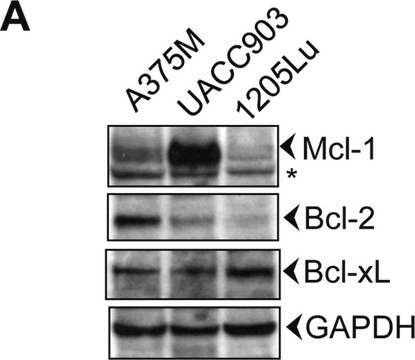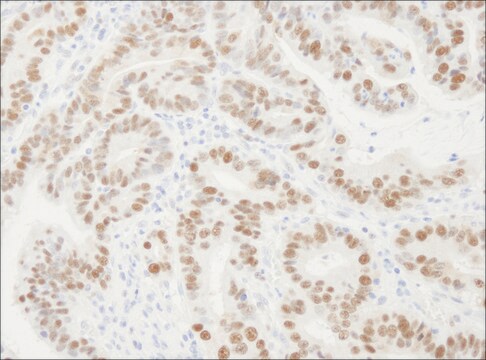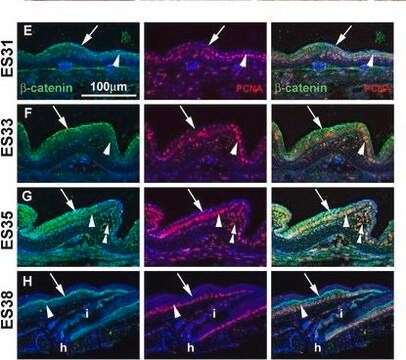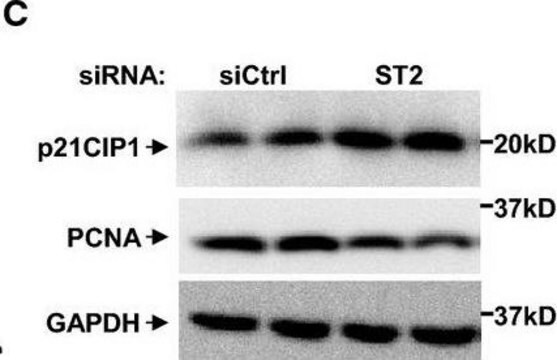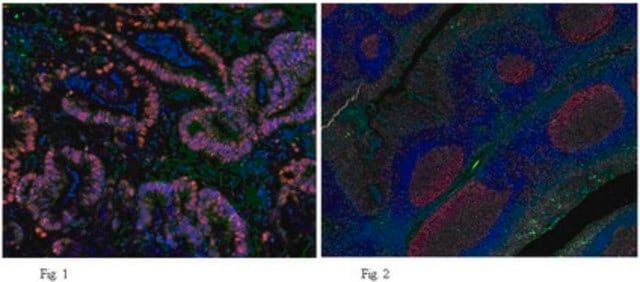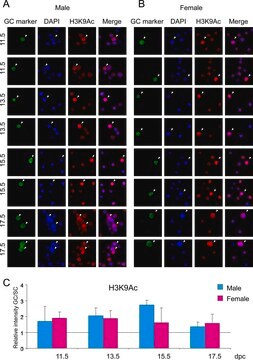추천 제품
생물학적 소스
mouse
Quality Level
항체 형태
purified immunoglobulin
항체 생산 유형
primary antibodies
클론
PC10, monoclonal
종 반응성
vertebrates, invertebrates
포장
antibody small pack of 25 μg
제조업체/상표
Chemicon®
기술
ELISA: suitable
flow cytometry: suitable
immunohistochemistry: suitable (paraffin)
immunoprecipitation (IP): suitable
western blot: suitable
동형
IgG2a
NCBI 수납 번호
UniProt 수납 번호
배송 상태
ambient
저장 온도
2-8°C
타겟 번역 후 변형
unmodified
유전자 정보
human ... PCNA(5111)
관련 카테고리
일반 설명
Proliferating cell nuclear antigen (PCNA) is a 36 kDa molecule that is highly conserved between species. PCNA was first identified as the antigen for a subpopulation of autoantibodies in patients with systemic lupus erythematosus (Miyachi, 1978; Takasaki, 1984; Ogata, 1987). It has since been determined that PCNA serves as a co-factor for DNA polymerase delta in S-phase as well as during DNA synthesis associated with mechanisms involved in DNA damage repair (Tan, 1987; Bravo, 1987). The temporal specificity of PCNA expression makes it an ideal marker for cell proliferation. PCNA begins to accumulate during the G1 phase of the cell cycle, is most abundant during the S phase, and declines during the G2/M phase (Kurki, 1988). Since the half-life of PCNA exceeds 20 hours, it may be possible to detect the protein in non-cycling cells.
특이성
Clone PC10 recognizes PCNA from all vertebrate and insect species tested and has been used to identify transformed cells (Kurki, 1988), proliferating cells in solid tumors (Smetana, 1983), and blast cells in leukemia patients (Takasaki, 1984). Immunohistochemistry with clone PC10 has been used to study the expression of PCNA in paraffin sections of normal tissues and lymphoid neoplasms (Hall, 1990). In proliferating cells, PCNA staining pattern is predominantly nuclear. By western blot, the antibody detects a polypeptide migrating at 36 kDa with an isoelectric point of 4.8.
면역원
Rat PCNA made in the protein A vector pR1T2T.
애플리케이션
Research Category
Epigenetics & Nuclear Function
Epigenetics & Nuclear Function
Research Sub Category
Cell Cycle, DNA Replication & Repair
Cell Cycle, DNA Replication & Repair
Use Anti-PCNA Antibody, clone PC10 (mouse monoclonal antibody) validated in ELISA, FC,IHC(P), IP, WB to detect PCNA also known as Proliferating Cell Nuclear Antigen, DNA Polymerase delta Processivity Factor.
Western blot: 1:250-1:1000. Nuclear extracts are preferred over whole cell protein extracts.
Immunohistochemistry: 1:20-1:200. Recommended for paraffin embedded tissue sections only. May be used on material fixed in a wide range of fixatives including formalin (buffered and unbuffered), methacarn and Bouin′s reagent. The time of fixation can markedly affect the intensity of PCNA immunoreactivity. Staining is reduced (and may be abolished) if sections are baked onto glass slides. Air-drying overnight on poly-L-lysine coated slides is recommended. 60 minute incubation at 25°C with standard ABC technique is recommended.
Immunoprecipitation
Indirect Flow Cytometry
Optimal working dilutions must be determined by the end user.
Immunohistochemistry: 1:20-1:200. Recommended for paraffin embedded tissue sections only. May be used on material fixed in a wide range of fixatives including formalin (buffered and unbuffered), methacarn and Bouin′s reagent. The time of fixation can markedly affect the intensity of PCNA immunoreactivity. Staining is reduced (and may be abolished) if sections are baked onto glass slides. Air-drying overnight on poly-L-lysine coated slides is recommended. 60 minute incubation at 25°C with standard ABC technique is recommended.
Immunoprecipitation
Indirect Flow Cytometry
Optimal working dilutions must be determined by the end user.
품질
Tested
표적 설명
36 kDa
물리적 형태
Format: Purified
Protein A Purified mouse immunoglobulin in PBS with 0.1% sodium azide as a preservative.
Protein A purified
저장 및 안정성
Maintain for 1 year at 2–8°C from date of shipment. Aliquot to avoid repeated freezing and thawing. For maximum recovery of product, centrifuge the original vial after thawing and prior to removing the cap.
분석 메모
Control
Rat kidney, Human tonsil, lymph node tissue
Rat kidney, Human tonsil, lymph node tissue
기타 정보
Concentration: Please refer to the Certificate of Analysis for the lot-specific concentration.
법적 정보
CHEMICON is a registered trademark of Merck KGaA, Darmstadt, Germany
면책조항
Unless otherwise stated in our catalog or other company documentation accompanying the product(s), our products are intended for research use only and are not to be used for any other purpose, which includes but is not limited to, unauthorized commercial uses, in vitro diagnostic uses, ex vivo or in vivo therapeutic uses or any type of consumption or application to humans or animals.
적합한 제품을 찾을 수 없으신가요?
당사의 제품 선택기 도구.을(를) 시도해 보세요.
Storage Class Code
10 - Combustible liquids
WGK
WGK 2
Flash Point (°F)
Not applicable
Flash Point (°C)
Not applicable
시험 성적서(COA)
제품의 로트/배치 번호를 입력하여 시험 성적서(COA)을 검색하십시오. 로트 및 배치 번호는 제품 라벨에 있는 ‘로트’ 또는 ‘배치’라는 용어 뒤에서 찾을 수 있습니다.
Rafia S Al-Lamki et al.
Oncotarget, 7(17), 24111-24124 (2016-03-19)
Compared to normal kidney, renal clear cell carcinomas (ccRCC) contain increased numbers of interstitial, non-hematopoietic CD133+cells that express stem cell markers and exhibit low rates of proliferation. These cells fail to form tumors upon transplantation but support tumor formation by
Monica Sanden et al.
BMC physiology, 9, 3-3 (2009-03-25)
The aim of the study was to examine the intestinal cellular localization of proliferating cell nuclear antigen (PCNA) and cytochrome P450 A1 (CYP1A) expression in Atlantic salmon Salmo salar L. exposed to a model toxicant. The stress response was induced
Marc Audebert et al.
The Journal of biological chemistry, 279(53), 55117-55126 (2004-10-23)
The efficient repair of DNA double-strand breaks (DSBs) is critical for the maintenance of genomic integrity. In mammalian cells, the nonhomologous end-joining process that represents the predominant repair pathway relies on the DNA-dependent protein kinase (DNA-PK) and the XRCC4-DNA ligase
Elizabeth L Thompson et al.
Nucleic acids research, 45(20), 11837-11857 (2017-10-24)
Fanconi anemia (FA) is an inherited cancer predisposition syndrome characterized by cellular hypersensitivity to DNA interstrand crosslinks (ICLs). To repair these lesions, the FA proteins act in a linear hierarchy: following ICL detection on chromatin, the FA core complex monoubiquitinates
Limei Piao et al.
Journal of the American Heart Association, 6(10) (2017-10-01)
Exposure to psychosocial stress is a risk factor for cardiovascular disease, including vascular aging and regeneration. Given that dipeptidyl peptidase-4 (DPP4) regulates several intracellular signaling pathways associated with the glucagon-like peptide-1 (GLP-1) metabolism, we investigated the role of DPP4/GLP-1 axis
자사의 과학자팀은 생명 과학, 재료 과학, 화학 합성, 크로마토그래피, 분석 및 기타 많은 영역을 포함한 모든 과학 분야에 경험이 있습니다..
고객지원팀으로 연락바랍니다.
